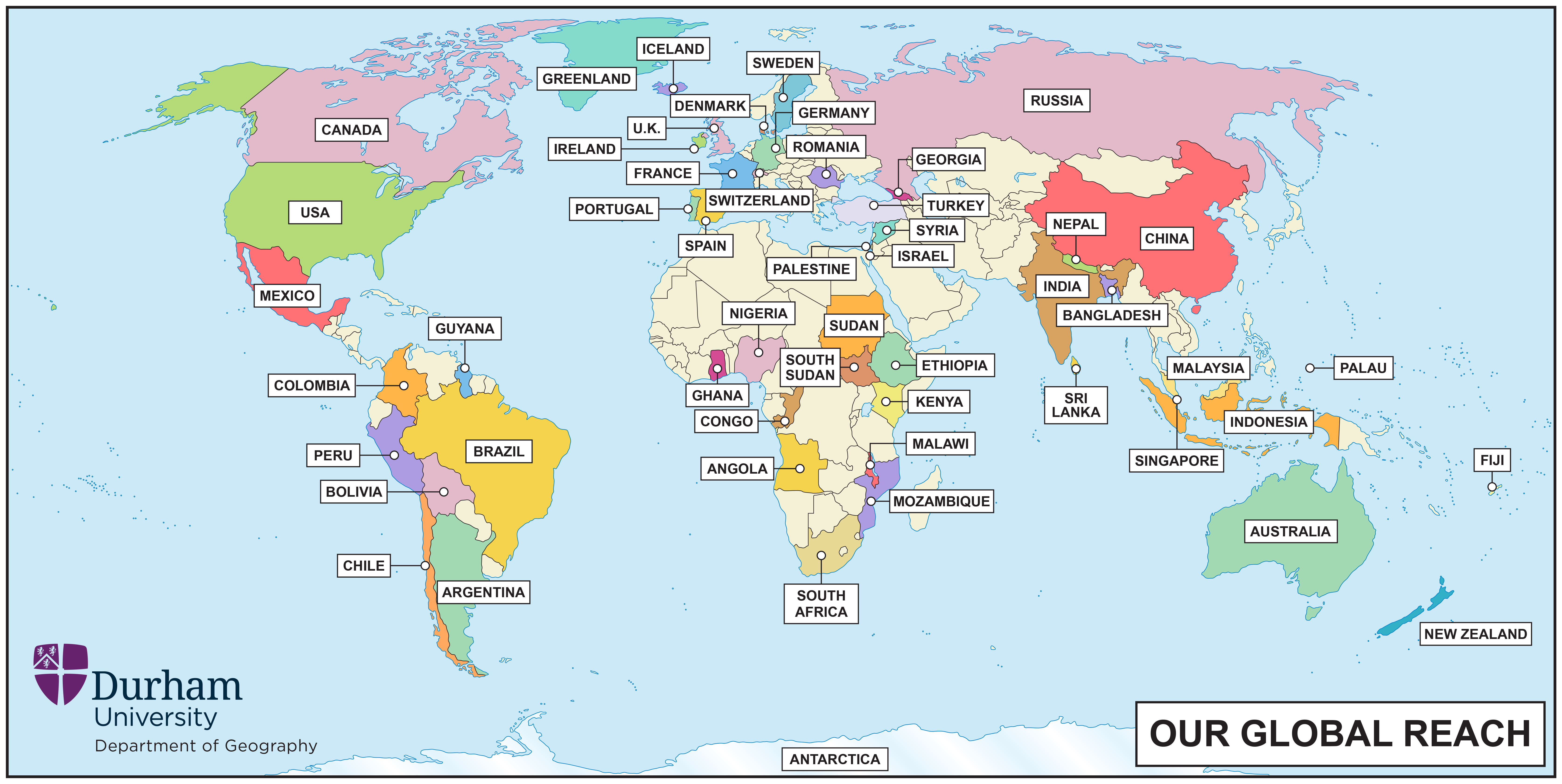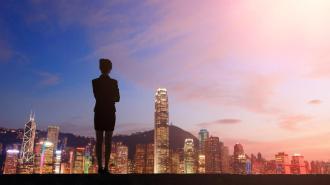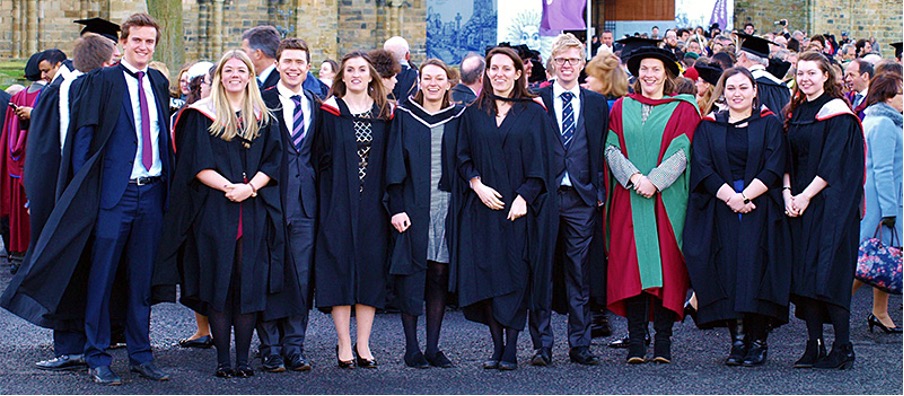Global challenges, global reach
Staff in our Department are engaged in research in a wide variety of locations around the world and their work is making a contribution to addressing a number of contemporary global challenges.
Map by Chris Orton, Cartography Unit, Durham Geography
Seventeen Goals to Transform Our World
![]() The research that we undertake in the Department is focused on and relevant to a variety of contemporary global challenges, including those concerning poverty, inequality, climate change, environmental degradation, migration, natural disasters and justice. In particular, many of our colleagues are doing work that is relevant to the pursuit of several of the Sustainable Development Goals. We have set out a selection of these below including links to the work of some of the staff involved.
The research that we undertake in the Department is focused on and relevant to a variety of contemporary global challenges, including those concerning poverty, inequality, climate change, environmental degradation, migration, natural disasters and justice. In particular, many of our colleagues are doing work that is relevant to the pursuit of several of the Sustainable Development Goals. We have set out a selection of these below including links to the work of some of the staff involved.
Goal 1 - End poverty in all its forms everywhere
![]() Eradicating extreme poverty for all people everywhere by 2030 is a pivotal goal of the 2030 Agenda for Sustainable Development.
Eradicating extreme poverty for all people everywhere by 2030 is a pivotal goal of the 2030 Agenda for Sustainable Development.
We have several colleagues who are examining questions of poverty, inequality and development. Dr Penelope Anthias has been researching extractivism, land rights, indigeneity and decolonisation in her work in Bolivia. Dr Mildred Ajebon has conducted research on health outcomes among poor population groups and on child health inequalities at different spatial scales in Nigeria. Professor Marcus Power has been researching energy poverty and inequality in Southern Africa and Asia.
Goal 2 - Zero Hunger
![]() Goal 2 is about creating a world free of hunger by 2030.
Goal 2 is about creating a world free of hunger by 2030.
Professor Mike Crang and Professor Cheryl Mcewan are currently involved in a project on 'Sustainable Consumption and Agri-food Ethics in the Global South'. Alex Sexton has conducted research on the geographies, politics and histories of food innovation, with a focus on high-tech meat and dairy alternatives.
Goal 3 - Ensure healthy lives and promote well-being for all at all ages
![]() A number of colleagues are working on Life and the Geographies of Wellbeing.
A number of colleagues are working on Life and the Geographies of Wellbeing.
Professor Sarah Atkinson has conducted research on health and wellbeing and Dr Mildred Ajebon has been doing research that seeks to understand a range of health outcomes among poor population groups (using Geographical Information Systems (GIS) and Remote Sensing applications).
Goal 5 - Achieve gender equality and empower all women and girls
![]() Gender equality is not only a fundamental human right, but a necessary foundation for a peaceful, prosperous and sustainable world.
Gender equality is not only a fundamental human right, but a necessary foundation for a peaceful, prosperous and sustainable world.
A number of colleagues in the Department do research that engages with feminist geographical approaches, that explores questions of gender identity and rights or that is focused on themes like sexualities, bodies and intimacy. EDI is also central to our Departmental community.
Goal 6 - Ensure access to water and sanitation for all
![]() Access to safe water, sanitation and hygiene is the most basic human need for health and well-being. Billions of people will lack access to these basic services in 2030 unless progress quadruples. Demand for water is rising owing to rapid population growth, urbanization and increasing water needs from agriculture, industry, and energy sectors.
Access to safe water, sanitation and hygiene is the most basic human need for health and well-being. Billions of people will lack access to these basic services in 2030 unless progress quadruples. Demand for water is rising owing to rapid population growth, urbanization and increasing water needs from agriculture, industry, and energy sectors.
Colin McFarlane has undertaken work concerning infrastructures of sanitation and has recently written on the theme of waste and the city.
Goal 7 - Ensure access to affordable, reliable, sustainable and modern energy
![]() In the Department we have a range of colleagues conducting research relevant to the pursuit of sustainable and affordable energy access. Marcus Power has recently been part of a project looking at Community Energy Systems and Sustainable Energy Transitions in Ethiopia, Malawi and Mozambique (CESET).
In the Department we have a range of colleagues conducting research relevant to the pursuit of sustainable and affordable energy access. Marcus Power has recently been part of a project looking at Community Energy Systems and Sustainable Energy Transitions in Ethiopia, Malawi and Mozambique (CESET).
Gavin Bridge has been working on geographies of energy transition and governance, Harriet Bulkeley has undertaken research on the affordability, sustainability and accessibility of renewable energy and Cheryl McEwan has researched the renewable energy transitions underway in South Africa. Sarah Knuth is also working on themes of energy and climate justice.
Goal 9 - Build resilient infrastructure, promote sustainable industrialization and foster innovation
![]() Goal 9 seeks to build resilient infrastructure, promote sustainable industrialization and foster innovation.
Goal 9 seeks to build resilient infrastructure, promote sustainable industrialization and foster innovation.
A number of colleagues in the Department conduct research around infrastructure and resilience. This includes work on energy or urban infrastructures. Andrew Baldwin is currently involved in a project on Inclusive Urban Infrastructure and Karen Lai has been doing research that paves the way for greener digital infrastructure.
Goal 11 - Make cities inclusive, safe, resilient and sustainable
![]() Goal 11 is about making cities and human settlements inclusive, safe, resilient and sustainable.
Goal 11 is about making cities and human settlements inclusive, safe, resilient and sustainable.
Research in the Sajag-Nepal project has contributed to urban resilience by quantifying the potential impacts from future large earthquakes in Nepal, supporting contingency planning by the Government of Nepal and humanitarian organisations.
Harriet Bulkeley has conducted research examining climate change and the roles of cities and other non-state actors in responding to this global challenge. We also have a broad community of scholars in the Department interested in Urban worlds.
Goal 12 - Ensure sustainable consumption and production patterns
![]() Goal 12 is about ensuring sustainable consumption and production patterns, which is key to sustain the livelihoods of current and future generations.
Goal 12 is about ensuring sustainable consumption and production patterns, which is key to sustain the livelihoods of current and future generations.
We have a number of colleagues in the Department working on themes of consumption, production and waste. This includes Mike Crang’s work on waste. Mike has also been working with Cheryl Mcewan on sustainable consumption and agri-food ethics in the Global South. Cheryl has also investigated alternative economies and ethical trade in South Africa.
Goal 13 - Take urgent action to combat climate change and its impacts
![]() Every person, in every country in every continent will be impacted in some shape or form by climate change.
Every person, in every country in every continent will be impacted in some shape or form by climate change.
Right across the Department we have colleagues conducting research on different aspects of climate change. Research in the Sajag-Nepal project has explored the use of seasonal and sub-seasonal forecasts to anticipate, and plan for, the impacts of monsoon-related hazards across Nepal. Harriet Bulkeley has been conducting research on cities and climate change whilst Andrew Baldwin has been researching climate change and migration. Colm O’Cofaigh is co-leading the Kang-Glac project assessing glacier change in Greenland during climactic warm periods. Chris Stokes has been researching ice sheets and glacier change as have other colleagues working in our research cluster focused on Sea Level, Ice and Climate.
Goal 14 - Conserve and sustainably use the oceans, seas and marine resources
![]() Goal 14 is about conserving and sustainably using the oceans, seas and marine resources. Healthy oceans and seas are essential to human existence and life on Earth.
Goal 14 is about conserving and sustainably using the oceans, seas and marine resources. Healthy oceans and seas are essential to human existence and life on Earth.
The Ocean is intrinsic to our life on earth. Covering three-quarters of the Earth’s surface, contain 97% of the Earth’s water, and represent 99% of the living space on the planet by volume.
Phil Steinberg has been conducting research on Wet Ontologies and Ocean Governance whilst Jessi Lehman has been examining the politics and economies of marine cultural heritage, asking how notions of heritage are mobilised to make claims to ocean space, resources, and narratives.
Goal 15 - Sustainably manage forests, combat desertification, halt and reverse land degradation, halt biodiversity loss
![]() Goal 15 is about conserving life on land. It is to protect and restore terrestrial ecosystems, sustainably manage forests, combat desertification, and halt and reverse land degradation and stop biodiversity loss.
Goal 15 is about conserving life on land. It is to protect and restore terrestrial ecosystems, sustainably manage forests, combat desertification, and halt and reverse land degradation and stop biodiversity loss.
Isabella Bovolo has done research on the topic of desertification. Laura Turnbull-Lloyd and John Wainwright have conducted research on land degradation.
Goal 17 - Revitalize the global partnership for sustainable development
![]() Goal 17 is about revitalizing the global partnership for sustainable development. The 2030 Agenda is universal and calls for action by all countries – developed and developing – to ensure no one is left behind. It requires partnerships between governments, the private sector, and civil society.
Goal 17 is about revitalizing the global partnership for sustainable development. The 2030 Agenda is universal and calls for action by all countries – developed and developing – to ensure no one is left behind. It requires partnerships between governments, the private sector, and civil society.
Marcus Power has been doing research concerned with the changing nature of aid, partnership and development co-operation. Cheryl Mcewan has also been looking at the emergence of trilateral forms of development co-operation.
Impacting the World
Our research culture is set up to generate research that is both intellectually innovative and impactful, addressing the key global challenges of our time and providing wider public and societal benefit.
Postgraduate Study
Postgraduate study at Durham helps you to develop a range of high-level research, analytic, and communication skills that are transferable to multiple career paths. Our postgraduates are highly valued employees in government, third sector and private agencies, as well as academia.
Contact Us
Founded in 1928, the Department of Geography at Durham University is one of the leading centres of geographical research and education in the world.
Department of Geography
Postgraduate Study
Durham University
Lower Mountjoy
South Road, Durham
DH1 3LE, UK
Tel: +44 (0)191 33418000


/prod01/prodbucket01/media/durham-university/departments-/geography/Matt_Couchmann-3872X1296.JPG)





